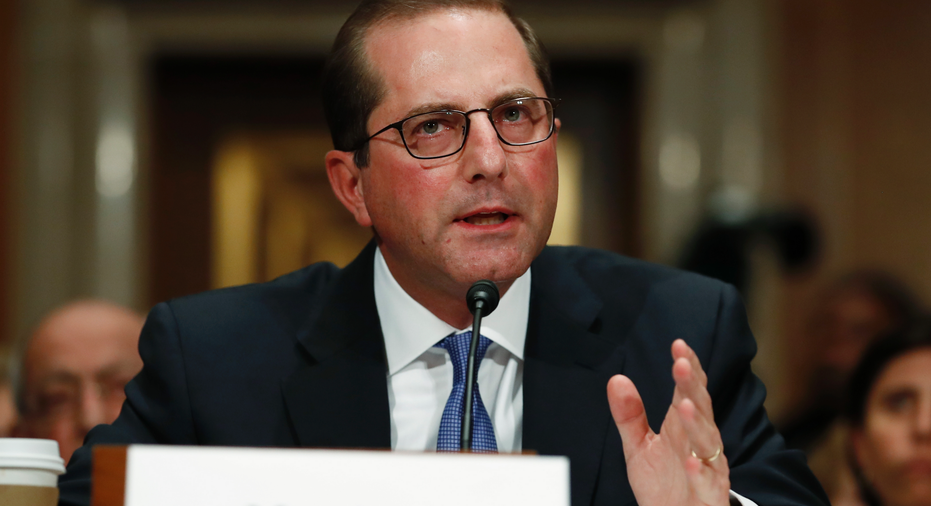Trump health pick parries questions on drug cost, health law

WASHINGTON – Calling it the opportunity of his lifetime, President Donald Trump's pick for health secretary pledged Wednesday to help lower drug prices and said he'd carry out the Obama-era health law his boss has been unable to erase.
Alex Azar's assurances to the Senate Health, Education, Labor and Pensions committee were met with doubt by lawmakers of both parties, especially Democrats concerned about his ties to the pharmaceutical industry.
Nonetheless the 50-year-old former drug company and government executive deflected Democratic attempts to paint him as a political partisan beholden to a powerful industry. Some Democrats, including Sens. Maggie Hassan of New Hampshire and Sheldon Whitehouse of Rhode Island, focused their questions on practical policy issues not tinged by ideological conflict.
"I don't have pharma's policy agenda," Azar said at one point. "This is the most important job I will have in a lifetime, and my commitment is to the American people."
Committee chair Lamar Alexander, R-Tenn., told Azar at the conclusion of the hearing that he believes the Senate will vote to confirm him.
Known as a brainy policy expert with a conservative political pedigree, Azar said his main priorities would be lowering drug prices, making health insurance more affordable, continuing Medicare's efforts to pay for value not just volume, and confronting the opioid epidemic.
On prescription drug costs, he said his combination of industry and government experience makes him uniquely suited to find solutions. Azar spent a decade as a top executive of pharmaceutical giant Eli Lilly and served in senior positions during a previous stint at the Department of Health and Human Services, which he'd now lead.
That was insufficient for Sen. Rand Paul, R-Ky.
"You've got some convincing to make me believe you're going to represent the American people, not big pharma," said Paul.
Paul demanded a written explanation from Azar on why it wouldn't be safe for U.S. patients to import lower-cost prescription drugs from other advanced countries. Drug companies have succeeded in staving off the imports challenge through successive administration of both parties.
Pressed on drug pricing, Azar said all players in the system — drug manufacturers, insurers, pharmacy benefit managers, and government — share some of the blame.
One of his top priorities would be to increase generic and brand drug competition, he said, and he vowed to crack down on drug company "gaming" to extend patents that ward off generic competition.
"Finger-pointing is not a constructive exercise — everybody in the system owns a piece of this," he said.
Sen. Elizabeth Warren, D-Mass., delivered a blunt appraisal: "Your resume reads like a how-to manual for profiting from government service," she told Azar, noting the millions he earned at Lilly.
Warren and other Democrats also said they worried Azar will continue the administration's efforts to "sabotage" the Obama-era Affordable Care Act, only do so with a polite smile instead of Trump's hard-edged rhetoric.
Azar confirmed he's no fan of the ACA, but refrained from calling it "Obamacare," a term coined by Republicans as a pejorative and now widely used.
He said he disagrees with the law's penalties on people who don't get health insurance. He asserted that the government should act to help consumers who don't qualify for health law subsidies but face its high premiums. He said he supports bipartisan legislation to stabilize insurance markets.
"If it remains the law my goal is to implement it in a way that leads to affordable insurance," said Azar. But Democrats dismissed that as coded language for undermining consumer protections such as minimum benefits.
"I don't think we can have an HHS secretary who doesn't support the health care safety net," said Sen. Tim Kaine, D-Va.
Azar was also quizzed about the Trump administration's "conscience exemption," which allows employers to opt out of providing free birth control to women. He said very few employers have invoked it, and signaled that he supported their ability to do so.
Health care issues have been a flashpoint between social and religious conservatives and those who are scientifically minded. Azar said, "I firmly believe in following evidence and science where it will take us."
The Senate Finance Committee will hold another hearing on Azar soon and formally decide whether to send the nomination to the full Senate.
Before resigning from Eli Lilly earlier this year, Azar built a financial portfolio now worth between $9.5 million to $20.6 million, according to disclosure records filed with the Office of Government Ethics.
If confirmed, Azar would be Trump's second HHS secretary, replacing Tom Price, who resigned under pressure after using private charter flights at taxpayer expense.



















